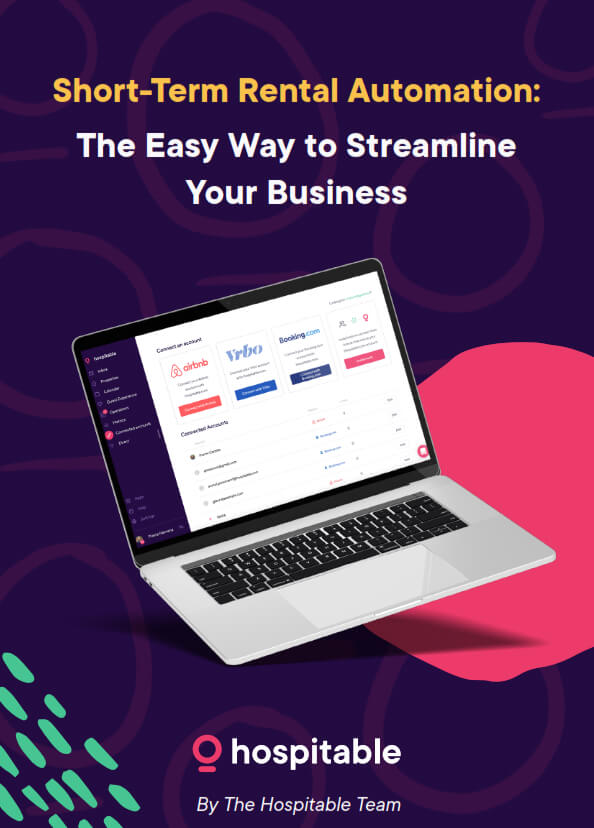By The Hospitable Team
Short-term rental sites like Airbnb or Vrbo make it easy for homeowners to rent out their properties to make extra cash. But while the financial benefits of listing your rental property on Airbnb are apparent, certain risks come along with renting your home or apartment to strangers.
In this article, we’ll walk you through common Airbnb risks that short-term rental property owners face and offer suggestions for preventing and overcoming these challenges.
5 Common Airbnb Risks That Hosts Face
Although the risks that Airbnb hosts face are certainly manageable, you should consider them when deciding to rent your property. If you know exactly what you’re facing, you’ll be able to take measures to mitigate the risks.
Frequent local regulation changes
An ever-changing regulatory environment is one of the critical risks for Airbnb hosts. Many cities have passed laws that are a part of their zoning or administrative codes, and they restrict short-term rentals. Many cities require property owners to register and get a permit and/or a business license before listing their vacation rentals on OTA websites. In addition, you might owe local taxes on any income you earn from your Airbnb. And in some locations, short-term rental bookings may be prohibited altogether.
Solution
To avoid the risk of penalties for running an illegal Airbnb business, all Airbnb hosts must understand how the laws work in their cities. You need to check local laws before listing your vacation rental home on Airbnb and keep up to date with any changes in local regulations that affect vacation rentals. Following relevant vacation rental associations might help keep up after the legislation changes.
Being aware of your city’s regulation changes will help you mitigate this risk and avoid legal troubles. You’ll have peace of mind to focus on providing the perfect experience for your guests and building a good reputation as a host. And automating your daily operations using tools like Hospitable will help you more efficiently manage your short-term rental and grow a successful business faster.
All your STR business in one convenient window
Start now with a 14-day free trial.
Damage to your rental property
When you accept Airbnb guests, you actually allow strangers to stay in your home, so you can never know how they will treat your property until they arrive. Besides, accidents happen. That means there’s always a risk that your property may get damaged by the guests you have staying over. This could be something small like broken plates or stains from wine on the carpet or even broken mirrors or furniture or destroyed floorboards.
Any damage to your place and belongings means financial losses because you’ll need money to repair or replace the item. Besides, until you repair the damage to your rental space, you can’t welcome the next guest, so you’ll have to cancel the booking and lose potential income as well.
Solution
Airbnb has a program called AirCover for Hosts that covers both property damage and liability. This Airbnb insurance policy automatically protects all hosts who list their properties on the platform, so you don’t have to register for it. But since damage protection in this program has some limitations and exclusions, you may opt for Airbnb homeowners insurance with enough comprehensive coverage for your rental property.
You should also inform your guests how they are expected to treat your vacation rental property in your Airbnb house rules. If you communicate your expectations clearly, your guests will be more likely to treat your property respectfully.
Renting to squatters
Many hosts may worry about the risk of renting their home to squatters, that are often very difficult to get rid of. In most states, laws protect squatters’ rights, leading to lengthy eviction processes that could cost you a lot of money in legal fees. And in the meantime, you also lose out on opportunities to rent your property to new Airbnb guests.
Solution
You’ll minimize your risk of dealing with dishonest guests with a proper screening process. Accept bookings only from verified Airbnb guests, and do your homework. Check out reviews of your potential guest written by other hosts and search for additional info about them online; for example, look for their social media accounts. You should also avoid long-term rentals on Airbnb unless your guests sign a rental agreement that clearly states all the terms and conditions of the stay.
Canceled bookings
Airbnb prioritizes customer satisfaction, so if your guest complains, Airbnb may decide to cancel their booking even after the check-in date and return all the money to the guest. That can happen no matter what your Airbnb cancellation policy is. In addition, they won’t even contact you first to discuss the cancellation. In worst-case scenarios, a booking can be canceled even after the guest has already checked out, which means you won’t get any payment.
Solution
Canceled bookings like this are generally rare, but sometimes, they are unavoidable. That’s why you should account for unforeseen cancellations that mean lost income in your Airbnb management strategy. You should also prepare a risk fund to meet potential losses.
To minimize your risk of sudden cancelations, you need to do your best to provide excellent service to your guests and ensure a great customer experience. Satisfied guests never complain and are more willing to give you 5-star reviews that can bring you more bookings. And since communication is an essential aspect of guest reviews, it’s crucial to get it right.
Writing great messages to each guest is time-consuming, but you can make your life easier using vacation rental software like Hospitable. With Hospitable, you can automate conversations with your guests from inquiry to review.
Have conversations with your guests even when you sleep.
Uncertain source of income
Perhaps it’s one of the most apparent Airbnb risks. Although Airbnb is a great way to make extra money, your income can’t be stable or predictable. In fact, the seasonality of travelers’ demand plays a huge role in determining how many bookings you get and how much income you earn renting out your property.
While occupancy is high during a peak season, the high vacancy rate will threaten your savings for the remaining part of the year when the demand for stays is low. That means you need to attract more travelers to mitigate the risk of vacancy.
Solution
You need to ensure that your Airbnb listing stands out from the similar listings in your area, and how you market your property is vital to this. Make your listing appealing to travelers. Create a catchy name for it and include a great description highlighting your property’s unique features and amenities. Add fabulous photos that show off the best of your property. Potential guests browsing Airbnb listings are more likely to stop and review yours when they see a place that looks neat, clean, bright, and open.
Don’t rely on one channel. The more channels you use, the more exposure you get and the higher your chances of getting an extra booking. Managing your listings on several channels manually takes A LOT of time and requires undivided attention to avoid double-bookings. A channel manager is a must if you take this route.
All you need from a channel manager is here!
Final Thought
Whether you’re a seasoned host or just looking to start a vacation rental business, it’s important to know the risks of being a short-term rental host. Hopefully, our article will help you understand the Airbnb risks hosts face when using the platform to run a vacation rental business. Being prepared to deal with the risks will allow you to develop strategies to mitigate them and minimize your loss.

Airbnb Restrictions: What Cities Have Strict Airbnb Regulations?
Renting out your property short-term to travelers is a great opportunity to earn extra cash. But it’s vital to ensure that you are fully compliant with any laws for your area at the city and state levels. This article will help you get started.

Airbnb Problems and How to Prevent Them
In most cases, Airbnb hosts don’t encounter any serious problems with running their businesses. But there are some situations when problems may happen despite your best effort. Read this article and make sure you’re well prepared.

Airbnb Requirements: Know your Paperwork
Local governments have been cracking down on Airbnb—with many outlawing (or severely prohibiting) it altogether. It’s a bit of a challenge to find the precise requirements to starting your Airbnb business. But don’t worry; this article is going to point you in the right direction and give you all the information you need to know (and where to get it) to be compliant.
Join the best!
from 140+ countries
grow with Hospitable

Download now!
To find the easy way to streamline your business.
